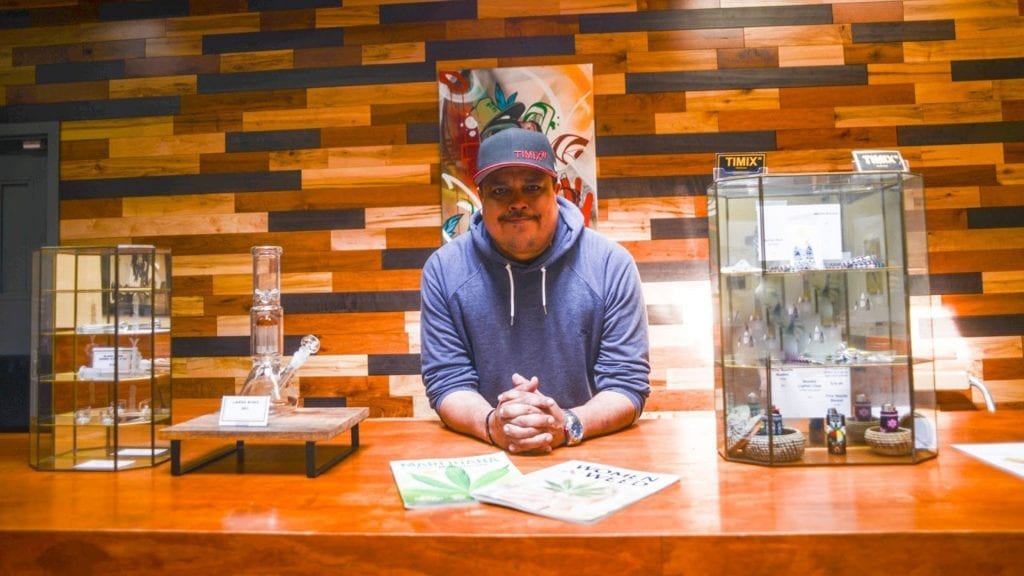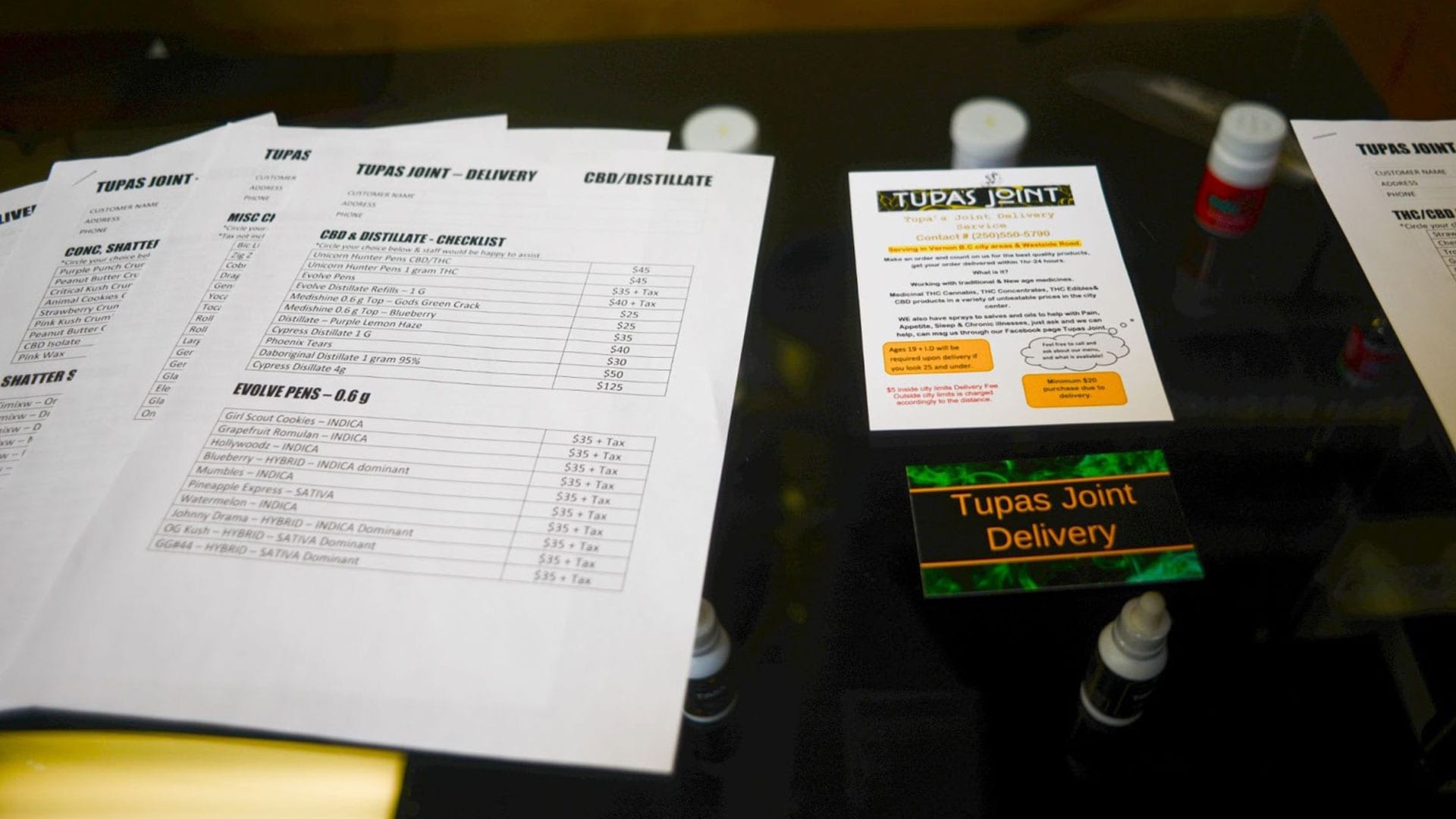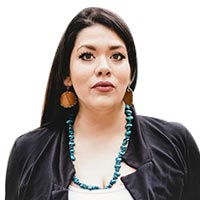
Cory Brewer, owner of Tupa’s Joint, says he’s evolving his business strategy after multiple, unsuccessful shut-down attempts by B.C.’s Community Safety Unit . Photo: Kelsie Kilawna/IndigiNews
Cory Brewer says the B.C. government’s successive attempts to shut down his cannabis dispensary and cultural wellness centre have inspired him to get creative — rather than close up shop, he’s moving and evolving.
Brewer, who is Syilx, opened Tupa’s Joint in May 2020 on unceded Syilx territory in Vernon, B.C., and the shop quickly drew the attention of investigators from B.C.’s Community Safety Unit (CSU).
The CSU is a branch of the B.C. government tasked with applying the province’s cannabis laws under the Cannabis Control and Licensing Act (CCLA).
Last June, CSU investigators carried out multiple raids on Tupa’s Joint, seizing thousands of dollars worth of product because the shop was operating without a provincial cannabis license — a license Brewer maintains he doesn’t need as a Syilx man operating on Syilx territory.
In February, CSU investigators contacted Stafford McKergow, the owner of the building where Tupa’s Joint operates in downtown Vernon.
“The CSU decided to contact us and say they were prepared to fine us if we didn’t shut Cory down,” McKergow tells IndigiNews in a text message.
Brewer says the latest attack on his business has served to empower him. Instead of shutting down, he’s evolving his business and collaborating with another local Indigenous-owned dispensary to offer cannabis bus tours in the North Okanagan.
Fighting back
IndigiNews visited Brewer on March 30 at his shop in downtown Vernon, where shelves are filled with displays of different types and strains of marijuana, displays of shatters, oils, and ointments.
Brewer is planning to move the shop to a new location on Tronson Road near the Vernon Airport. In the meantime, he’s launched a delivery service.
He’s also formed a partnership with Terra Vida Wellness, another Indigenous-owned dispensary in Vernon.
Brewer says they acquired a bus together and they’re planning to offer accessible bus tours that will take people throughout the North Okanagan, so they can learn about cannabis and buy products from other sovereign shops.
He’s hoping to start offering tours in June, and Brewer invites people to keep an eye on their Facebook page for updates.
“We created a new industry out of what they’ve done,” he says. “We will evolve and continue to smash through the blockades they put up.”
Brewer says Tupa’s Joint is currently storing products for delivery at his other dispensary, Timxw Wellness.
That dispensary is located on OKIB’s reserve land, where licensed cannabis dispensaries are protected under the OKIB’s Cannabis Control Law, which came into effect on May 4, 2020.

The B.C. government maintains that colonial laws ultimately trump laws formed by Indigenous communities when it comes to cannabis.
“Cannabis laws are laws of general application that apply across the province, including on reserve and treaty settlement lands,” says a spokesperson B.C.’s Ministry of Public Safety and Solicitor General in an email to IndigiNews on April 8th.
“By-laws or legislation enacted by Indigenous governments can co-exist with the federal and provincial or territorial cannabis laws as long as they do not conflict with or frustrate the purpose of the federal, provincial or territorial laws.”
Colonial claims to authority
North of Syilx territory, in the centre of so-called British Columbia, Witset First Nation has also implemented its own cannabis law, which came into effect in March 2020.
Witset has also opened a cannabis shop on reserve, in partnership with Indigenous Bloom, a company with a mission to provide “opportunities for First Nations and Indigenous Peoples to cultivate and sell cannabis product for medicinal and recreational purposes.”
Trevor Morrison is the chief executive officer of Kyah Development Corporation, which is owned by Witset and was formed, according to their website, with the intention of “managing the Band’s portfolio and investments in businesses and other ventures.”
With the profits from the cannabis store and various other projects, Morrison says the community has plans to expand.
“We’re looking at building a cultural centre, and the community wants an arena, so different types of infrastructure,” he says. “It could also go into supporting the recreational and Elders programs, so it’ll be put towards supporting the community.”
Morrison says he’s been contacted multiple times by provincial government officials with respect to their cannabis laws.
“We are trying to succeed and make some money and take advantage of this industry and they don’t like it,” he says.
“I just tell them to — that the reserve is under federal jurisdiction and the province doesn’t have a right to tax us or enforce privity on us.
“We had to send them a letter to inform them of our rights,” he says, adding that B.C.’s Declaration on the Rights of Indigenous Peoples, which was passed in November 2019, “gives us the right to do business with [anyone] on our traditional territory.
“It’s a form of our self-determination.”
In March 2019, Yvan Guy Laroque, a Métis lawyer from Miller Titerele and Company, called out Canada for not living up to its promises at the BC Cannabis First Nation Forum — which was organized by the B.C. Assembly of First Nations.
“Although Canada claims that they have recognized Aboriginal peoples’ rights to self-government, they have consistently fought communities who have sought to assert their inherent jurisdiction and rights to self-government outside of the confines of Canadian law (ie. the Indian Act, common law, treaties, etc.),” reads a point on one of his slides.
Bigger than cannabis
While Brewer continues to provide the City of Vernon with cannabis products, he wants people to know that this ongoing tension isn’t simply about cannabis.
As previously reported by IndigiNews, it’s about having sovereignty recognized, both off and on reserve.
A 2018 report from the Standing Senate’s Committee on Aboriginal Peoples found there was “a lack of consultation with Indigenous communities and organizations in the development of Bill C-45 [Cannabis Act].”
“There was an alarming lack of consultation particularly given this Government’s stated intentions of developing a new relationship with Indigenous people,” the report states.
Brewer says he will continue to make moves to grow and develop his business and practice his rights, no matter what tactics they use to try and shut him down.
“That was their last hope, to threaten our landlord, but we’re still here, we’re still open, and now we’re just going to be transforming into something stronger than they’ve ever thought of,” Brewer says.
“It’s not about product anymore,” he says. “It boils down to Title and Rights, and whose land they are on — they don’t really understand that.”











